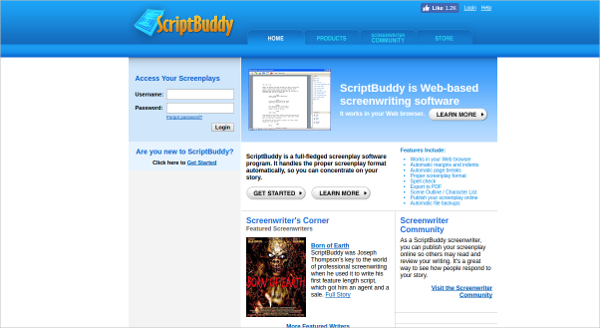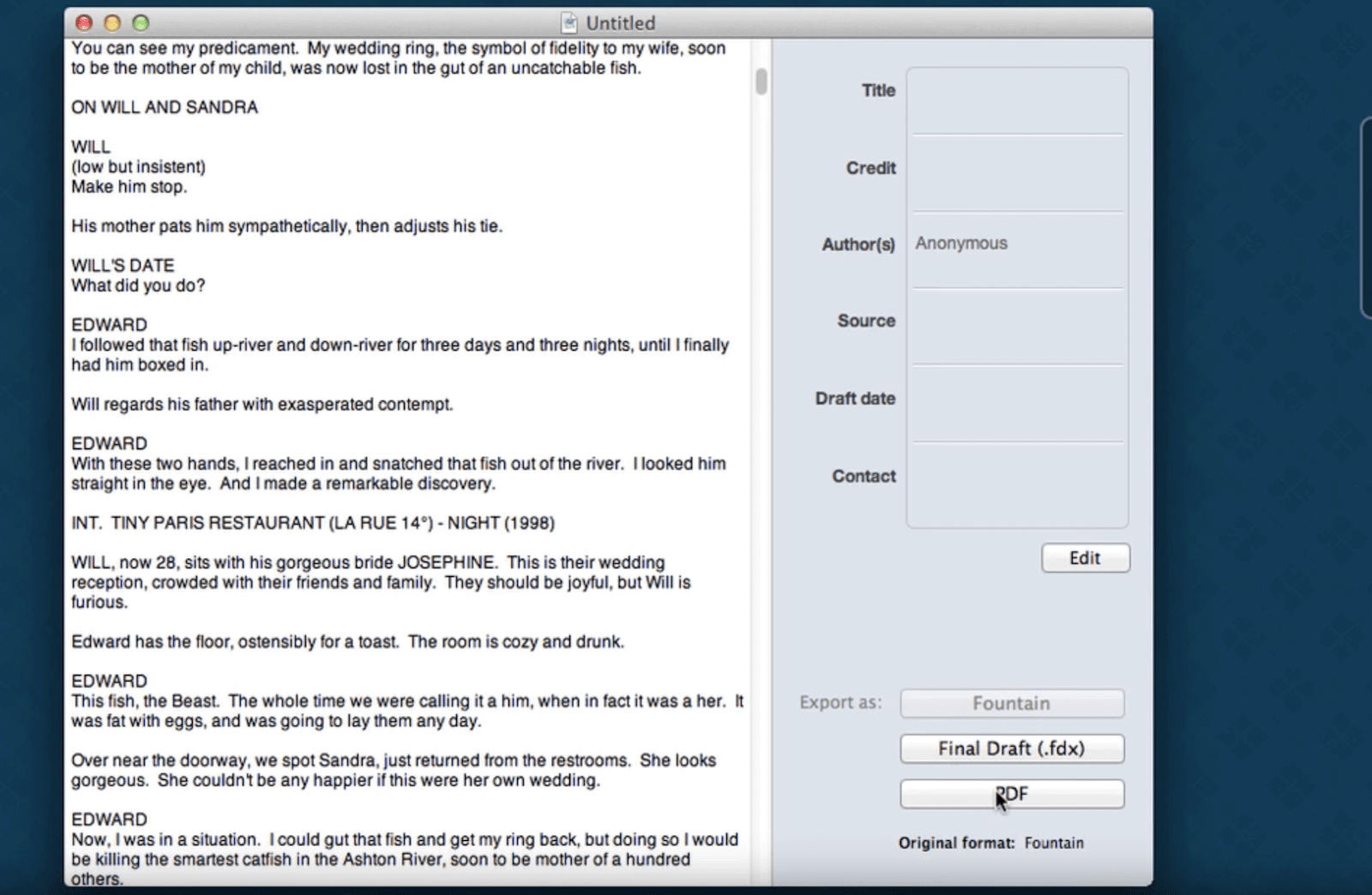![]()
- Free Screenwriting Software For Windows
- Free Script Writing Software For Windows 7
- Free Screenwriting Software Windows 10
Online Video, TV & Film Production Management Software and Screenwriting. Manage cast and crew, create and share call sheets, script breakdown sheets.

Want to learn the art of writing a screenplay? Check out Trelby, open source screenwriting software you can try right now if you’re a Linux or Windows user.
Whether you’re an aspiring writer or a planning on becoming a YouTube star, knowing how to write a script is an essential skill. It’s possible, of course, to write a screenplay using Microsoft Word, but using software built for screenplays saves a lot of time. Formatting for screenplays is very specific, so why waste time imitating it? It will just frustrate you, distracting you from your writing.
Screenwriting software can be expensive, however: Final Draft, an industry standard, costs $249. This isn’t a problem for established writers, of course, but is a significant sum if you’re waiting tables while also waiting for your big break.
Don’t resort to piracy. Trelby is completely open source, meaning you can download it and start writing right now, free of charge. It works on Windows and Linux computers, and a Mac version could be released soon. Even better: it’s easy to use, and works great. It even supports Final Draft files, to a certain degree.
Using Trelby
Like most screenwriting software, Trelby is about one thing: writing. The software may seem confusing at first, especially if you’ve never used screenplay software, so check out the Trelby getting started guide. It will outline a few concepts, which I’ll get into briefly.
Basically, you start writing. You can use the Tab and Enter keys to change the kind of copy you’re writing, or “elements”.
Different elements of a script, such as action, dialogue, character names and parentheticals, are automatically detected based on where you are in the script. You can see what element the current line is, and which keys to press to change that, at the top-right of the screen.

Play around with this and you’ll get the hang of it. If you plan on writing screenplays regularly it will all become second nature, but you will need to know the basics of screenplay writing to really take advantage of this software. Be sure to read the Trelby manual to learn even more, or check out this site to learn the basics of writing a good screenplay.
Need a distraction-free environment? Switch to fullscreen mode.
Thinking of printing your masterpiece and sending it to Spielberg? Don’t forget to make a titlepage first.
Just so you know: Neither I nor MakeUseOf are responsible if Spielberg doesn’t write back to you. You should have sent the script to someone more powerful.
Download Trelby
Want to try this out and get started writing your screenplay? Head to the Trelby download page. You’ll find .deb packages for Ubuntu and Debian users, source code for other Linux users and an installer for Windows users. Sorry Mac users: there’s currently no Mac version to download, though there might be soon – Trelby is looking for volunteers to make a port.
Free Screenwriting Software For Windows
Conclusion
Free Script Writing Software For Windows 7
I’m not an expert when it comes to writing screenplays, but I plan on using this software for upcoming YouTube-related projects. I’ll let you guys know if any of them turn out well.
Will you be using Trelby? Let me know in the comments below, along with links to your cinematic masterpieces.
Explore more about: Filmmaking, Text Editor, Writing Tips.
Free Screenwriting Software Windows 10
Very good............
It does not support Turkish. Peh !
I would *love* trelby to be as great as Final Draft 8, because I really love Linux. It's just not though. Eventually, I hope it will be. I'm sure that I could adapt Libre Writer to work just as good, but Final Draft is just *way* to easy to use out of the box:
- It auto-completes names
- It makes it easy to select the element that you want to work with
- It keeps an outline of your scenes on screen
- It has numerous ways to view your screenplay
- It even has a font that's 'more screenplay,' as its look has become an industry standard.I really hope trelby keeps developing.
Trelby auto-completes names. I personally don't like that feature, but it has it.
Pretty element of content. I just stumbled upon your website and in accession capital to claim that I get in fact enjoyed account your weblog posts. Anyway I'll be subscribing in your augment and even I fulfillment you get right of entry to constantly rapidly.
I know this is an ancient article, but...what the crap?
Thank you for the tip! It looks great! :)
We're a gaggle of volunteers and opening a new scheme in our community. Your website offered us with useful information to paintings on. You have done a formidable job and our entire neighborhood can be grateful to you.
I write fiction primarily, and am not familiar with the ins and outs of screenwriting lingo. But as I have just completed the first draft of a novel, I can second that notion about M$ Word or any of the other WP apps/suites as being useless for tackling large documents like a book or screenplay. Word is too bloated to handle the expansive nature of 200+ page novels or 120-page scripts, and I actually find it distracting even without the chatty paperclip. ;-)
It's also not good for 'turning off your inner editor,' as it flags grammatical errors and spelling mistakes that maybe are intentional depending on what you're writing. An example would be the novels Charley or Precious, in which the main character's dialogue is deliberately constructed as to be rife with errors and mistakes, because both Charley and Precious are of limited mental capacity. I know you can just turn off spell-check, but even without that added feature, it just always crashes when forced to handle large documents, and not only that, it often doesn't format the manuscript properly (page numbers, etc.) if you try to work around this limitation by making each chapter a separate document.
For my most recent project I used one of those full-screen text editors, one by the name of Q10. I then intend to combine all the .txt files into a single printed document using Scrivener, the famed 'writer's word processor' for Mac that just released a version for Windows; it's about $40 but well worth the investment. I don't do my writing *in* Scrivener itself, the note-cards or what have you; I just use the document-combining feature that automatically formats the end result in standard manuscript format, ready for printing or for exporting to PDF or the various e-book formats.
Word is probably best for writing high school term papers and quick office memos. As a creative writing program, well, it's plainly obvious that Bill Gates wasn't an English major, otherwise he would have had Jonathan Franzen's thousand-page doorstops in mind. ;-)
I'm not sure how it is that someone capable of drafting a screenplay seems incapable of ticking or unticking user chooser options in the software they use.
The assertion that Word conflicts with one's 'inner editor' is downright silly: Word only flags grammatical errors and misspellings if that's what the user asks it to do.
A screenplay is easily 'formatted' in Word -- I know, because I've done it several times -- by dint of 'building' the initial scenes (including dialog) with the industry-standard visual shorthands and upper / lower case codings, and then simply copying those four or five pages and pasting for re-use as one trundles along.
As to finishing up with a 'large' document, there's something spectacularly wrong with a screenplay if that's how it ends up: hundreds of pages is usual for a novel, hundreds of pages for a screenplay, definitely not.
Microsoft Word doesn't topple over, either on large docs or compilations, and especially where novel writing is concerned: I create chapter by chapter, and use Word to total up the word count at the end of each so that way, both I and my agent (and my publisher's editor) have a running, accumulative total of the MSS.
It's simplicity itself to use Word's footer feature to incorporate whatever is required, and especially the actual page number, be a running MSS of 600 pages or 60. If as ZB Manfred contends, Word keeps 'crashing' then there's either something wrong with her / his computer or with her / his installation of the program itself.
I'm not criticising in any way the software so kindly flagged up here by MUO, simply trying to point out that (1) there's a very good reason why publishers, editors, writers and agents use MS Word quite happily and -- perhaps more importantly -- that (2) far too many aspirant screenwriters get hung up on the notion of 100% accurate formatting as they go along, when in fact, the simplest annotations can be scribbled anywhere on the page, in any font, in any style, and in any position and tidied up afterwards: it's the calibre of the creative process, not mastery of the technical process, that counts.
Everytime I see that left handed close button, I remember why Canonical gives me douche chills.
Im not sure I understand why this couldnt be added as some kind of plugin to LibreOffice since its reallly about preset formatting. Heck, couldnt this be added as a LO template?
Its a great idea to save time but Im not sure a whole different word processor is needed for this nice option..
Downloading this for a friend, and i know he'll love it...
Just in time for script frenzy.
just what i was looking for! thanx